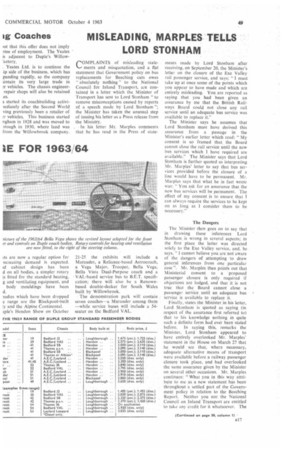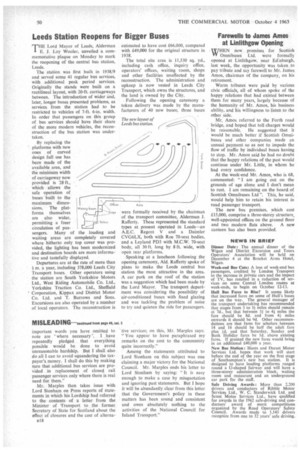MISLEADING, MARPLES TELLS LORD STONHAM
Page 51

Page 52

If you've noticed an error in this article please click here to report it so we can fix it.
COMPLA1NTS of misleading statements and misquotation, and a flat statement that Government policy on bus replacements for Beeching cuts owes "absolutely nothing" to the National Council for Inland Transport, are contained in a letter which the Minister of Transport has sent to Lord Stonham "to remove misconceptions caused by reports of a speech made by Lord Stonham "; the Minister has taken the unusual step of issuing his letter as a Press release from the Ministry.
In his letter Mr. Marples comments that he has read in the Press of state ments made by Lord Stonham after receiving, on September 20, the Minister's letter on the closure of the Exe Valley rail passenger service, and says: "I must take up at once some of the points which you appear to have made and which are entirely misleading. You are reported as saying that you had been given an assurance by me that the British Railways Board could not close any rail service until an adequate bus service was available to replace it."
The Minister says he assumes that Lord Stonham must have derived this assurance from a passage in the Minister's earlier letter which read: " My consent is so framed that the Board cannot close the rail service until the new bus services which I have required are available." The Minister says that Lord Stonham is further quoted as interpreting Mr. Marples' letter to say that bus services provided before the closure of a line would have to be permanent. Mr. Marples says that what he in fact wrote was: You ask for an assurance that the new bus services will be permanent, The effect of toy consent is to ensure that I can always require the services to be kept on as long as I consider them to be necessary."
The Dangers
The Minister then goes on to say that in drawing these inferences Lord Stonham is wrong in several aspects; in the first place the letter was directed solely to the Exe Valley service, and, hc says, "I cannot believe you are not aware of the dangers of attempting to draw general inferences from one particular case ". Mr. Marples then points out that Ministerial consent to a proposed passenger closure is only required if objections are lodged, and that it is not true that the Board cannot close a passenger service _until an adequate bus service is -available to replace it.
Finally, states the Minister in his letter, Lord Stonham is quoted as saying (in respect of the assurance first referred to) that to his knowledge nothing in quite such a definite form had ever been stated before. In saying this, remarks the Minister, Lord Stonham appeared to have entirely overlooked Mr. Marples' statement in the House on March 27 that he would see that, where necessary, adequate alternative means of transport were available before a railway passenger closure took place, and had overlooked the same assurance given by the Minister on several other occasions. Mr. Marples continues: What you in this way attribute to me as a new statement has been throughout a settled part of the Government policy in relation to the Beeching Report. Neither you nor, the National Council on .Inland Transport are entitled to take any credit for it whatsoever. The
important words you have omitted to note are 'where necessary '. I have repeatedly pledged that everything possible would be done to avoid unreasonable hardship. But I shall also do all I can to avoid squandering the taxpayer's money. I shall do this by making sure that additional bus services are provided in replacement of closed rail passenger services only where there is real need for them."
Mr. Marples then takes issue with Lord Stonham on Press reports of statements in which his Lordship had referred to the contents of a letter from the Minister of Transport to the former Secretary of State for Scotland about the effect of Closures and the cost of alterna a 18 tive services; on this, Mr. Marples says: "You appear to have paraphrased my remarks on the cost to the community quite incorrectly."
Among the statements attributed to Lord Stonham on this subject was one claiming a major victory for the National Council. Mr. Marples ends his letter to Lord Stonham by saying: "It is easy enough to make a case by misquotation and ignoring past statements. But I hope it will be abundantly clear from this letter that the Government's policy in these matters has been sound and consistent and owes absolutely nothing to the activities of the National Council for Inland Transport."








































































































































































